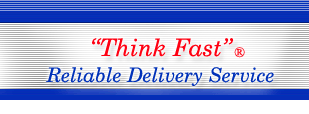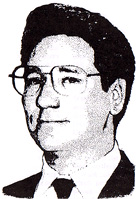 |
 |
||||
 |
|||||
 |
| Login |
| Online orders are only available Monday through Friday
7:30 AM to 5:00 PM Please call 281-497-2218 |

Randy Ward: Steering a
Top-Notch Delivery Service
By Gail Rickey
Houston Business Journal
Profile Section
Week of April 8, 1985
Few people claim that starting a business is easy. You have to wonder about the honesty - or intelligence - of those who say otherwise. Randy L. Ward, who launched his own company at age 25, affirms that embarking on such a venture can be tough, requiring 100 percent commitment. And he doesn't mind admitting that being youthful compounds the difficulty of the task. "It's easy to be 'taken' as a young man - I was vulnerable." But the people who were willing to help him far outnumbered those who tried to take advantage of his inexperience, Ward emphasizes.
Now 30, Ward heads Hour Messenger Service, which has grown from a telephone in his home with himself as the only driver, to a company headquartered in a high rise office building, hiring 35 drivers and a staff of seven. The young entrepreneur would have had difficulty finding a more competitive industry to enter. In addition to the 480 delivery services listed as such in the phone book, there are probably 2,000 more mom-and-pop operations, Ward estimates.
His company's specialty is one-hour delivery service, with a "super special" of 30 minutes. If the speed of service which the client requires is not possible due to distance involved or prevailing traffic conditions, "we tell them we can't do it," Ward says. While he alludes to a "secret" which enables the company to provide rapid service, he adds that assigning the fastest driver located closest to the pick-up is part of the company's overall plan.
Ward credits Hour Messenger Service's growth, now averaging 10 to 12 percent a month after quantum jumps in its first months of existence, to "good service at a competitive price," and adds that his staff "treats all customers as if they are the only one we have." But there have definitely been setbacks along the way, Ward admits. While the most serious drops in business have been the direct result of the economic slowdown (for example, when housing sales dropped, so did orders from builders and title companies), others have resulted from internal problems. Yet he has come out a winner - and he views the future with confidence and optimism.
Growing up in New Orleans, Ward had jobs as a teenager mowing grass, working in construction and helping his father in his car-polish manufacturing company. The youth decided that "college was not for me," opting instead to come to Houston with his father and set up a manufacturing operations here. But after a year, the company was sold. "That left me holding the ball in the wrong court," Ward says. "My five years of experience were down the tube."
Unsure of what direction to take, he enlisted in the Navy, an experience which he credits with having a significant influence on his philosophy of running a business. "I learned that 'if it is to be, it's up to me,' that there is no one else to do it for me." His present-day work habits are rooted in Navy days. "I am very meticulous, very demanding - I don't like procrastinators."
When he got out of the Navy, Ward became a mud-logging engineer for Baroid, working offshore. While the job itself had little relationship to his eventual entrepreneurial venture, it provided an environment which triggered both his personal goals and his career choice. Today he vividly recalls the "turning point" in his life. He was on his way to an offshore rig when a hurricane began roaring into the Gulf unexpectedly, giving rise to gigantic waterspouts. "The pilot said if one hit us, we would be dead." In the face of death, Ward felt his "whole life blossom," and "ever since that moment, I have wanted to treat people right and give more than I receive."
Working seven days offshore and having the next seven days free, Ward supplemented his income by driving for a Houston messenger service. "I loved it… it's taking advantage of the free enterprise system," he says. Since he was paid a percentage of each delivery that he made, he knew the only limitations were the ones he imposed on himself. "It took me a year to learn the city. After that, I became their top driver."
At last he knew what he wanted to do with his life: If he could succeed in the delivery business by working for someone else, why not try it on his own. Granted, his resources consisted of only a van and $43. But he had enough ambition to "go for it."
His father gave him a lead that helped land the first client - a local title company. "People were always helping me. They knew I was young and ambitious. A small printer gave me 1,000 tickets. He said he knew if my company grew, I would give him my business."
Meanwhile, Ward continued to work for the delivery service where he got his start. "I told him (the owner) that I would never approach his customers," recalls Ward. "He offered to help me." Even though they are now competitors, the two men continue to be supportive of each other, Ward says.
For the first few months, he operated the business out of his trailer, with his girlfriend answering the phone while he made deliveries. Intent on building up a clientele, he took all the jobs that came along, whether he could make a profit on a particular delivery or not. Unlike today when he can dispatch the nearest driver to make a pick-up, Ward himself was always the closest driver. "Every time I made a delivery, I said, "I'm starting my own company - try me.'"
As his business grew from 29 deliveries the first month to over 800 the fourth month, Ward began hiring drivers. And he bought a "top-of-the-line" radio dispatch system. While he was relatively new in the industry, he was convinced that providing high quality service was the key to winning clients. Not only did he want his drivers to be efficient, but he also insisted that they make a good impression when they met customers face to face, so he required them to be well dressed. "My company is a reflection of me."
Before long, the operation had outgrown his trailer, so he bought a house and utilized two rooms for the business. By the time he had 17 drivers, he knew he had to move on. "My house was being overrun. And I got tired of waking up answering the phone and saying, 'Hour Messenger Service'."
Ward's company became one of the first tenants in the Mac Haik Building on the Katy Freeway. The owner was attracted by pro rated terms and by the ninth floor office overlooking the freeway below. (The dispatcher looks onto the busy thoroughfare, which transforms his job from one of looking at lifeless names on cards to feeling an identity with the driver with whom he is communicating, explains Ward.)
Perhaps the move to such an elegant quarters was premature, the business owner says in reflection. Not only did it more than double his monthly costs, but such a transition involved more outlays than he had anticipated. "I have learned not to overextend myself, " he says. "It was hard to foresee all of our expenses." And yet his business doubled within the first two months of the move. Today his facilities allow for the rapid growth which the company has historically experienced. "We could do more than three times our present number of deliveries for the same overhead we have now."
Acknowledging that being competitive in price is necessary for survival, Ward says the companies most successful promotion has been a radio ad campaign publicizing Christmas delivery at a discount rate. "Christmas Eve (1984) was our busiest day ever. All the phones were lit up like Christmas trees, " with calls from customers wanting fruit trays, cakes and flowers delivered as well as wrapped packages.
Looking back over the company's progress, Ward professes that he has been lucky. "People have liked me and wanted to see me do well, " he says, listing such people as a banker who enabled him to make a payroll when cash was limited. Yet success has not been easy. For example, Ward's lack of business knowledge and inexperience led to having to pay a substantial fine to the IRS. "I was glad I was audited when I was," Ward claims, explaining he would have continued to make the same errors, resulting in a larger fine, if they had not been pointed out.
Seated in his spacious executive office, with numbered prints by Salvador Dali on the wall and a pool table by the expansive windows, Ward says the achievement he is proudest of is turning his dreams into reality. Most of his work today involves the operation of the company, but that doesn't mean he isn't willing to pitch in and do whatever job is needed. "I love to dispatch. It's like I am looking down at the city and driving all those vehicles. "If a driver is not available to make a delivery, especially in response to a night or weekend call, Ward does it himself. "I don't want my name tarnished and I save the commission I would pay the driver."
Calling the industry a high-pressure one, Ward plays golf to release tension. Yet the sport is much more than a form of relaxation for the young executive; he aspires to become a professional golfer some day. Correlating his success in his business and his favorite sport, he says, "I play out scenarios in my mind. Whichever one works out best for the company is the one I choose. And I do the same thing when I play golf."
Ward talks about future business plans, which include operating two other companies - Taxi Van for transporting groups on a demand basis and Leasa Limousine Services. But whatever the particular type of transport he is discussing, he always returns to his basic premise about the importance of service. "People want you to give them the best, the most personal service they've ever had. Everybody likes to be treated like they're special."
For more information about Hour Messenger Service or to schedule your Same Day Delivery service in Houston, contact Randy Ward at Hour Messenger or call 281-497-2218.
|
Professional Web Site Design
provided by Page Concepts
Hour Messenger Delivery: 11767 Katy Freeway, Suite #630, Houston, TX 77079 | 281-497-2218
|